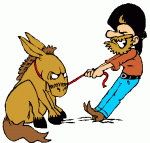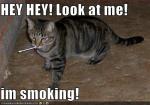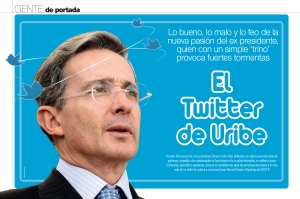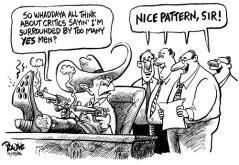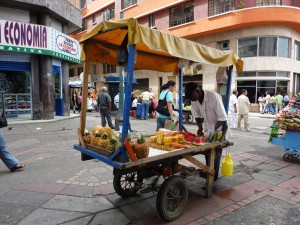Puns, Colombia’s Relationship to Korea and Chaebols
…Juegos de palabra, la relacion entre Colombia y Corea y sus Chaebol
It’s Valentine’s Day week so let’s talk about relationships. Free trade commercial relationships. 😉
In this post, we’ll take another look at puns and some great articles on South Korea, one of Colombia’s new free trade partners. This commercial relationship will gain more importance over the next several years and now is the time to get ahead of it or prepare ourselves for future deals between Korea and Colombia.
The language of international business is English. That’s why Bogota Business English is such a great way to improve your professional prospects by getting your English to the next level. Prepare yourself!
We’ve bolded some words or phrases that we’ll explain below. Also try to determine which words or phrases are puns Forget what a pun is? Review here. The following excellent article comes from the Economist’s SEOUL desk and discusses the Chaebol or conglomerate problem in South Korea.
Bakers and chaebol in South Korea
Let them eat cake
A half-baked effort to curb the conglomerates
SOME parents give their children cakes. A few give them cake shops. The hot topic in South Korea is the trend for daughters and grand-daughters of chaebol families to open bakeries and other small food outlets. The chaebol are the conglomerates that dominate the Korean economy, so these plutocratic pâtissières have deeper pockets than any of the little bakers they compete against.
Their baking has provoked outrage. Lee Myung-bak, South Korea’s president, calls it a “hobby” business for rich girls that threatens the livelihood of poor shopkeepers. Lee Ju-young, a member of the national assembly, likens it to Park Ji-sung (Manchester United’s Korean midfielder) lording it over amateurs in a backstreet game of football. A restaurateur in Seoul puts it more plaintively: “These families already control everything else in Korea. Why can’t they leave something for the rest of us?”
The chaebol families have decided that this is not a battle worth picking. Scions of the Samsung, LG and Hyundai dynasties are all hanging up their aprons. Artisée, a chain of swanky pastry shops run by Lee Boo-jin, whose dad is the chairman of Samsung, is to close. So is the Hyundai-affiliated Ozen.
Whether this will help small bakers much is open to question. Artisée has only 27 shops; Ozen a mere two. Both are cupcakes in comparison to SPC Group, which operates more than 3,000 Paris Baguette shops in Korea. Buns have always been SPC’s bread and butter—and its boss is not an heiress.
Some say all this pie-throwing distracts attention from the real problems that overmighty chaebol cause. Entrepreneurs complain that if they have a good idea, the chaebol show up with their chequebooks and poach their staff. Small firms that supply chaebol complain that they are ruthlessly squeezed, though few dare say so publicly.
Consumers also suffer. Korea’s Fair Trade Commission (FTC) detected over 3,500 cases of price-fixing in 2010, but only 66 led to fines. The average penalty amounted to just 2.3% of unfairly earned revenue. Samsung and LG were fined in January for fixing the prices of notebook PCs and flat-screen televisions between June 2008 and September 2009. Samsung was ordered to pay a fine of 25.8 billion won ($23m); LG, 18.8 billion won. LG’s fine is to be waived, in return for co-operation with the FTC. This is the third time the two firms have been caught price-fixing in the past two years.
Politicians follow the same old recipes when dealing with the chaebol. They lean on banks to lend cash to small firms. And they lean on the chaebol to stay out of a few minor businesses, such as baking or tofu-making. However you sugarcoat it, this is not serious reform.
Wow. This article was full of puns! I counted 7 puns. And you?
We’ve learned a little bit more about Colombia’s new trading partner, now lets understand some of the vocabulary.
Let them eat cake – famous quote attributed to Queen Marie Antoinette that implies socio-economic divisions (PUN b/c references food) [que coman pasteles]
half-baked – badly planned or executed (PUN b/c references food) [mal concebido, medio cocinado]
curb – slow down or stop something. [refrenar, poner freno a algo]
chaebol – Korean word for the conglomerates that control much of the Korean economy. French word for pastry. (English borrows many words!) [conglomerado en Corea]
pâtissière – French word for pastry. (English borrows many words!) [confitería]
battle not worth picking – an argument or fight that is more trouble than it is worth [no vale la pena la molestia]
scion – descendent [descendiente]
hang up something – give up something or quit some activity [colgar algo, renunciar participar en alguna actividad]
Peyton Manning is hanging up his pads and giving up football.
apron – a garment or clothing article covering part of the front of the body and tied at the waist, for protecting the wearer’s clothing. (PUN b/c used to make food) [delantel]
swanky – fancy [elegante y lujoso, tal vez ostentoso]
bread and butter – core area. (PUN b/c references food) [pan de cada día]
Bavaria’s bread and butter is beer.
pie-throwing – a silly and messy fight [pelea con pasteles]
chequebook – British English for checkbook. [chequera]
poach – to illegally hunt and kill. Used metaphorically it means to break rules in order to gain something or someone. [cazar furtivamente]
price-fixing – illegally setting a price between several parties so that the consumer pays more than is normal [pacto ilícito para fijar artificialmente los precios ]
same old something – an often repeated something that is not desired [el mismo algo de siempre]
Most institutes have the same old format with standardized content. Nothing is personalized like Bogota Business English!
recipe –list of ingredientes and steps to achieve something, usually a dish or food item (PUN b/c references food) [receta]
lean on – pressure (politically) or threaten [presionar a alguien]
sugarcoat – make a bad situation seem better with positive words. (PUN b/c references food) [disfrazar, endulzar]
You can’t sugarcoat what is happening in Greece.
Interested in understanding the Chaebols further? See this other great Economist article.
Need to improve your English to trade with Korea? Talk to Bogota Business English.
Juegos de palabra, La relacion entre Colombia y Corea y Chaebol
…Puns, Colombia’s Relationship to Korea and Chaebols
(version ingles – english version)
Es la semana de día de san valentin. Pues hablamos de relaciones… ¡relaciones comerciales! 😉
Miramos otra vez a los juegos de palabras o puns y algunos articulos sobre el estado de la economía en Corea de Sur, uno de los nuevos socios de libre comercio con Colombia. Esta relacion comercial va a leventar en importancia durante los proximos años. Ya debemos prepararnos para los tratos futuros entre Colombia y Corea.
El idioma de negocio internacional es inglés. Por esta razon Bogota Business English es una herramienta excelente para mejorar su futuro profesional mediante aprender inglés. ¡Prepárate!
Hemos puesto unas palabras al negro abajo y las explicamos más adelante. Mira a las palabras y cuenta la cantidad de puns. Olvidaste que es un pun? Recuerdate. El articulo excelente a contuniacion viene de The Economist y sus escritores de SEOUL, COREA y trata el problema de los Chaebol o los conglomerados en Corea.
Bakers and chaebol in South Korea
Let them eat cake
A half-baked effort to curb the conglomerates
SOME parents give their children cakes. A few give them cake shops. The hot topic in South Korea is the trend for daughters and grand-daughters of chaebol families to open bakeries and other small food outlets. The chaebol are the conglomerates that dominate the Korean economy, so these plutocratic pâtissières have deeper pockets than any of the little bakers they compete against.
Their baking has provoked outrage. Lee Myung-bak, South Korea’s president, calls it a “hobby” business for rich girls that threatens the livelihood of poor shopkeepers. Lee Ju-young, a member of the national assembly, likens it to Park Ji-sung (Manchester United’s Korean midfielder) lording it over amateurs in a backstreet game of football. A restaurateur in Seoul puts it more plaintively: “These families already control everything else in Korea. Why can’t they leave something for the rest of us?”
The chaebol families have decided that this is not a battle worth picking. Scions of the Samsung, LG and Hyundai dynasties are all hanging up their aprons. Artisée, a chain of swanky pastry shops run by Lee Boo-jin, whose dad is the chairman of Samsung, is to close. So is the Hyundai-affiliated Ozen.
Whether this will help small bakers much is open to question. Artisée has only 27 shops; Ozen a mere two. Both are cupcakes in comparison to SPC Group, which operates more than 3,000 Paris Baguette shops in Korea. Buns have always been SPC’s bread and butter—and its boss is not an heiress.
Some say all this pie-throwing distracts attention from the real problems that overmighty chaebol cause. Entrepreneurs complain that if they have a good idea, the chaebol show up with their chequebooks and poach their staff. Small firms that supply chaebol complain that they are ruthlessly squeezed, though few dare say so publicly.
Consumers also suffer. Korea’s Fair Trade Commission (FTC) detected over 3,500 cases of price-fixing in 2010, but only 66 led to fines. The average penalty amounted to just 2.3% of unfairly earned revenue. Samsung and LG were fined in January for fixing the prices of notebook PCs and flat-screen televisions between June 2008 and September 2009. Samsung was ordered to pay a fine of 25.8 billion won ($23m); LG, 18.8 billion won. LG’s fine is to be waived, in return for co-operation with the FTC. This is the third time the two firms have been caught price-fixing in the past two years.
Politicians follow the same old recipes when dealing with the chaebol. They lean on banks to lend cash to small firms. And they lean on the chaebol to stay out of a few minor businesses, such as baking or tofu-making. However you sugarcoat it, this is not serious reform.
Wau. Este articulo estaba llenisimo de puns. Conté 7 y tu?
Hemos aprendido de nuevo socio comercial… y ya aprendemos el vocabulario.
Let them eat cake – famous quote attributed to Queen Marie Antoinette that implies socio-economic divisions (PUN b/c references food) [que coman pasteles]
half-baked – badly planned or executed (PUN b/c references food) [mal concebido, medio cocinado]
curb – slow down or stop something. [refrenar, poner freno a algo]
chaebol – Korean word for the conglomerates that control much of the Korean economy. French word for pastry. (English borrows many words!) [conglomerado en Corea]
pâtissière – French word for pastry. (English borrows many words!) [confitería]
battle not worth picking – an argument or fight that is more trouble than it is worth [no vale la pena la molestia]
scion – descendent [descendiente]
hang up something – give up something or quit some activity [colgar algo, renunciar participar en alguna actividad]
Peyton Manning is hanging up his pads and giving up football.
apron – a garment or clothing article covering part of the front of the body and tied at the waist, for protecting the wearer’s clothing. (PUN b/c used to make food) [delantel]
swanky – fancy [elegante y lujoso, tal vez ostentoso]
bread and butter – core area. (PUN b/c references food) [pan de cada día]
Bavaria’s bread and butter is beer.
pie-throwing – a silly and messy fight [pelea con pasteles]
chequebook – British English for checkbook. [chequera]
poach – to illegally hunt and kill. Used metaphorically it means to break rules in order to gain something or someone. [cazar furtivamente]
price-fixing – illegally setting a price between several parties so that the consumer pays more than is normal [pacto ilícito para fijar artificialmente los precios ]
same old something – an often repeated something that is not desired [el mismo algo de siempre]
Most institutes have the same old format with standardized content. Nothing is personalized like Bogota Business English!
recipe –list of ingredientes and steps to achieve something, usually a dish or food item (PUN b/c references food) [receta]
lean on – pressure (politically) or threaten [presionar a alguien]
sugarcoat – make a bad situation seem better with positive words. (PUN b/c references food) [disfrazar, endulzar]
You can’t sugarcoat what is happening in Greece.
Estás interesado en aprender más de los Chaeobol? Mira a este otro articulo de The Economist.
Necesita mejorar su inglés para negociar con Corea? Talk to Bogota Business English.
When Can Confidence and Success Be Bad For Business
…Cuando Pueden Ser Malo La Confianza y El Exitó Para Su Negocio?
(version español haz clic acá)
This is part of the 7 habits of bad business leaders series. Check out the other parts here. The purpose of the series is to break down the English language in Eric Jackson’s Forbes article for non-native speakers.
Confidence and success are usually good in business. There are a couple of situations where these qualities in a leader can be very bad. When confidence and success begin to distort a leader’s reality, companies suffer.
Bad Habit #6: Bad leaders underestimate obstaclesWarning Sign: Excessive hype
Bad Habit #7: Bad leaders stubbornly rely on what worked for them in the past
Warning Sign: Constantly referring to what worked in the past
Vocabulary:
To distort is to misrepresente or give a false, perverted meaning to something.
To underestimate is to calculate or think something is less than it is.
An obstacle is a challenge or hurdle.
Something excessive is too much of something.
Hype is exagerrated publicity of something or the dramatic and exciting promotion of something. It usually emphasizes a very positive and sometimes false version of reality. Something hyped is something promoted in a dramatic way or emphasizing characteristics that may not be real.
To stubbornly act is to act despite being told not to. A stubborn person is one that think they are right even when they are told they are not.
Bad habit 6 idea: Habit 6 leaders think challenges are less difficult than they are. While leaders need to be positive, they sometimes are too positive and do not recognize reality. Maybe they isolated themselves from people that told them the naked truth. (See habit 3 and 4)
There is a fairy tale about believing the hype called The Emperor’s New Clothes. In this story the emperor is convinced to believe that his new clothes could only be seen by those worthy to see them. In reality there were no clothes and a small child pointed this out. In the end the emperor looked very stupid. The consequences in business go beyond looking stupid to hurting future business deals, financing and losing customer support.
Cuando Pueden Ser Malo La Confianza y El Exitó Para Su Negocio?
…When Can Confidence and Success Be Bad For Business?
Esta entrada es la primera parte del serie sobre los 7 habitos de malos lideres de negocio y se pueden mirar las otras partes acá. El proposito del serie es discutir el inglés usado en el articulo de Eric Jackson para hablantes no nativos.
La confianza y el exito usualmente son buenos para el negocio. Aunque hay unas situaciones cuando sea malo las calidades indicadas que se manifestarian en un lider. Cuando la foncianza y el exito distorcionan la perspectiva de realidad de un lider, la empresa sufre.
Bad Habit #6: Bad leaders underestimate obstaclesWarning Sign: Excessive hype
Bad Habit #7: Bad leaders stubbornly rely on what worked for them in the past
Warning Sign: Constantly referring to what worked in the past
Vocabulario:
To distort significa distorsionar o pervertir el significado de algo.
To underestimate significa subestimar, calcular mal o pensar que algo es menos que es.
An obstacle significa un obstaculo o un reto o una valla.
Algo excessive es algo excesivo o demasiado de alguna calidad.
Hype es la publicidad con bombos y platillos, es decir la publicidad exagerada. Usualmente se pone una cara muy positiva y a veces falsa sobre un producto, empresa o algo promocinado. Algo hyped es algo promocionado de manera dramatica y con enfasis de cosas tal vez falsas o no 100% verdaderas.
To stubbornly act significa hacer algo de manera terca o hacer algo a pesar de la solicitud de no hacerlo. Una persona stubborn es una persona terca o que piensa tiene toda la razon a pesar de opinas al contratio.
Habito malo 6 la idea: Los lideres de clase habito 6 cree que los obstaculos son menos complicado que son. Es la verdad que los lideres deben poner positivos, a veces ellos son demasiados positivos y no reconocen la realidad. Tal vez se ailaron de gente que les dijo la verdad. (Mira los habitos malos 3 y 4)
Hay un cuento de hadas sobre este comportamiento se llama The Emperor’s New Clothes. En esta historia, el emperador está convencido a creer que la ropa nueva solo se puede ver por los merecidos. En realidad, no había ningun trapo de ropa. Al final de cuento, el emperador se vio como un bobo.
En negocio las consequenias van más alla que parecer estupido a dañar las ofertas de negocio, el financimiento y el resbaldo de clientes.
How attention-seeking leaders are bad for business
…Como los liders que buscan atención son malos para el negocio
This is part of the 7 habits of bad business leaders series. Check out the other parts here. The purpose of the series is to break down the English language in Eric Jackson’s Forbes article for non-native speakers.
You want to call attention to your business, right? Well, maybe. We’re going to look at the habit of bad leaders that can cause problems for themselves and their companies.
See the other articles in the series on leader isolation and behavior choices. Bad habit source material comes from Eric Jackson’s excellent Fobes article.
Bad habit #5: Leaders are consummate spokespersons, obsessed with the company image
Warning Sign: Blatant attention-seeking
Habit 5 vocabulary: To be consummate is to be very skilled or perfect.
Company image or public image is how the company is percieved by the public or by others.
Being obsessed is having a obsession o preocuppation with something. An obsession dominates and strongly influences one’s thoughts, feelings and desires.
A blatant action is a deliberate action or done on purpose.
Attention-seeking behavior is acting in a way such as that calls attention to oneself.
Habit 5 idea: The idea is that these leaders are very skilled or perfect at public interaction. While this is good but they also are excessively preoccupied (obsessed) and spend less time on real problems and more time on what people think.
The warning sign of this habit can itself be a problem. Attention-seeking behavior distracts from the business and its goals. Though leaders want good public image, the opposite sometimes results from attention-seeking behavior!
Former President Uribe has recieved criticism for his attention-seeking tweets and political endorsements. He seems obsessed with the image of his presidency. This attention seeking behavior has actually hurt his public image according to some.
Como los liders que buscan atención son malos para el negocio
…How attention-seeking leaders are bad for business
Esta entrada es la primera parte del serie sobre los 7 habitos de malos lideres de negocio y se pueden mirar las otras partes acá. El proposito del serie es discutir el inglés usado en el articulo de Eric Jackson para hablantes no nativos.
Quieres llamar atención a tu negocio, no? Uhhm, quizás. Vamos a ver un habito de los lideres malos que causa problemas para ellos mismos y sus empresas.
Bad habit #5: Leaders are consummate spokespersons, obsessed with the company image
Warning Sign: Blatant attention-seeking
Vocabulario habito 5: To be consummate es perfecto o bien habil.
Company image o public image es como se ve la empresa por el publico u otras partes.
To be obsessed significa tener una obsesion o preocupacion grave de algo o alguíen. Un obsession domina y influye bien los pensamientos, sentimientos y deseos de la persona.
Un acción blatant es deliberada o heco a propositó.
Comportamiento de attention-seeking es actuar de una manera que llama atención a una persona misma.
La idea, habito 5 La idea es que los lideres son muy habiles o casi perfecto a la interaccion social y publica. Es una habilidad buena aunque los lideres están preocupados demasiados (obsessed) y usan menos tiempo tratando los problemas verdaderas y más tiempo tratando de manejar la imagen de la empresa.
El señal de avertencia para este habito, comportamiento de busca atención, se puede ser un problema. El comportamiento distrae la atención de empleados y el lider mismo del funcionamiento y las mestas de la empresa. Aunque los lideres queren una imagen publica buena, el contrario resulta a veces de su comportamiento de busca atención!
Por ejemplo, ex Presidente Uribe ha recibido criticos por que hizo unos tuits-tweets y refrendo political para llamar atención a la marca Uribe. Se dice que está obsessed o obsessionado con la imagen de su presidencia pasada. Según a unos, el comportamiento de busca atención ha dañado su imagen.
How To Recognize Bad Leaders That Isolate Themselves
…Como se pueden reconocer los lideres malos que aislarse?
(para la versión en español, hacer clic aquí)
 This is part of the 7 habits of bad business leaders series. Check out the other parts here. The purpose of the series is to break down the English language in Eric Jackson’s Forbes article for non-native speakers.
This is part of the 7 habits of bad business leaders series. Check out the other parts here. The purpose of the series is to break down the English language in Eric Jackson’s Forbes article for non-native speakers.
Habits 3 and 4 really are about leaders who isolate themselves…
Bad habit #3: Leaders think they have all the answers
Warning Sign: A leader without followers
Bad habit #4: Leaders ruthlessly eliminate anyone who isn’t completely behind them
Warning Sign: Executive departures
Vocabulary: To isolate is to reduce or elimate the connections to something. The idea of isolating or isolation is not always bad. Isolation is good when you need to think without distraction tempoarily. But permanent isolation is bad. Would you want to be isolated from your friends and family forever?
Acting ruthlessly is acting coldly or without caring about others. Sometimes we say someone ruthless is ‘cutthroat.’ The TV series Breaking Bad, a great series to practice your listening, featured several characters acting coldly or ruthlessly.
If you are not behind someone or something, you do not support or agree with them. For example, President Santos is not behind Hugo Chavez but he is behind the legalization of marijuana. (Seriously, read about it here.)
Habit 3, the idea: If leaders think they have all the answers they do not listen to others. Maybe they hear what others say but stubbornly disagree because they believe they are right. We call this a ‘know it all‘. Who wants to be around that type of person? They isolate themselves unintentionally or without wanting or intending to.
Habit 4, the idea: Leaders that eliminate anyone that disagrees with them do not want internal opposition. They want people that agree with them. So they make people leave by firing them or forcing them to quit. Clearly habit 4 is an intentional habit of someone that wants to isolate themselves.
These type of leaders show up in politics. Often political leaders remove dissenting or disagreeing opinions from their ‘inner circle‘ or small group of trusted advisors and supporters. The problem with removing dissenting opinions is that one only surrounds themself with ‘yes men‘ or people that never disagree. You don’t get good feedback and you become slow to recognize mistakes.
Learning English in isolation or without good feedback is a slow way to learn a language. Find yourself a good institute with great teachers like Bogota Business English.
¿Como se pueden reconocer los lideres malos que aislarse?
…How to Recognize Bad Leaders that Isolate Themselves
(para la versión en inglés – english version click here)
 Esta entrada es la primera parte del serie sobre los 7 habitos de malos lideres de negocio y se pueden mirar las otras partes acá. El proposito del serie es discutir el inglés usado en el articulo de Eric Jackson para hablantes no nativos.
Esta entrada es la primera parte del serie sobre los 7 habitos de malos lideres de negocio y se pueden mirar las otras partes acá. El proposito del serie es discutir el inglés usado en el articulo de Eric Jackson para hablantes no nativos.
Los habitos 3 y 4 tratan los lideres que aislanse…
Bad habit #3: Leaders think they have all the answers
Warning Sign: A leader without followers
Bad habit #4: Leaders ruthlessly eliminate anyone who isn’t completely behind them
Warning Sign: Executive departures
Vocabulario: To isolate es reducir o eliminar las connexiones de algo a otros elementos. La idea de aislarse o en inglés isolation está bien a veces. El aislamiento o isolation en inglés es bueno cuando necesites pensar sin distraecion. Aunque el aislamiento permanente es malo. Quires estar aislado de los amigos la famila para siempre?
Acting ruthlessly significa comportarse frio o sin cuidar otros. A veces se dice alguien ruthless es ‘cutthroat.’ La serie Breaking Bad cual un buen recurso para practicar escuchando a inglés (mira otros recursos para practicar inglés acá) destacó varios personajes comportandose frio o acting ruthlessly.
To be behind alguien o to be behind algo, significa que respaldas a la persona o estás de acuerdo con algo. Por ejemplo, President Santos is not behind Hugo Chavez but he is behind the legalization of marijuana. Santos no respalda a Hugo Chavez pero está de acuerdo con la legalización de marijuna. (En serio, leer más.)
Habito 3, la idea: Si los lideres creen que tienen todas las respuestas, es decir saben todo, no van a escuchar a otros. Tal vez escuchan a otros pero sotenen de manera terca sus ideas por la creencia que tienen la razon. Se llama en inglés un ‘know it all‘. Quien quiere trabajar con ese tipo? Los lideres de habito 3 se aislan sin querer o se aislan unintentionally.
Habito 4, la idea: Los lideres que eliminan la presencia de la gente que no se acuerda son los lideres que no queren oposicion interna. Quiren la gente que están de acuerdo con el lider. Ellos hacen que la gente salga por la despedida o la renuncia forzada. Habito 4 es claramente un habito intentional o intencional para aislarse.
Notamos este lider en la politica. Los lideres politicos sacan usualmente la gente de opiniones en contra o descrepantes, dejando un ‘inner circle‘ o un consejo pequeño de personas de confianza y partidarios. El problema con eliminar las opiniones en contra es que se rodea con ‘yes men‘ o los hombres que dicen que ‘si’ a todo. En tal caso no recibas buena retroalimentacion y seas lento para reconocer los errores.
Aprender inglés en aislamiento o sin buena retroalimentación es una manera lenta para aprender un idioma. Busca un buen instituto con muy buenos profesores tal como Bogota Business English.
Como se puede explicar en ingles los puestos ambulantes?
…How can You Explain the Colombian Push Carts in English?
The folks at Jack Magazine did a great job explaining the Colombian push carts. This is something that just does not exist in US, Canada, UK or Europe and you might want to explain it to someone when you are in one of those countries. Reed the article now. (It is good practice.)
La gente a Jack Magazine hizo un buen trabajo en explicar los carritos de los vendedores ambulantes cual se ven en la calle. No existen los carritos en otros paises tales como EEUU, Canada, RU o Europa. Leer más. (Es buena practica.)
Some good vocabulary // vocabulario debe recordar:
Push cart = shopping cart or other wheeled cart that you can push // el carrito del puesto ambulante
Decontextualized = removed from its normal context // sacado del contexto normal
Convenience store = a store with common items // tienda
Informal employment sector = the part of the work force that is not reported to the government, typically do not pay taxes // la parte de la fuerza laboral que no paga los impuestos ni informa al gobierno
Speak of something = mention something // mencionar algo
Hardship = financial difficulties // pernuria
Desperation = the state of being reckless or dangerous because of despair or urgency // desesperación
Daily survival = the daily act of staying healthy, happy and unaffected by hardships // sobrevivencia diaria
MacGyver = secret agent character from TV show MacGyver did amazing things with basic items, like stop or diffuse a bomb with a paperclip. // agente secrete del serie de TV MacGyve que consigó logros estupendos con articulos basicos, tal como detener una bomba con un clip.
Cobble = fix or put together roughly // arreglar de manera bruta
Baby carriage = baby stroller // cochecito de niño
Milk crate = a slatted wooden box // caja madera de lamas
Scrap = little piece // pedacito
Pedestrian = pertaining to walkers // peatonal
Fishing pole = rod used to fish // caña de pescar
Pirate ship = a boat used by buccaneers // barco de pirata
Super-deluxe = very luxuriousv// de super lujo
On-board = installed and functional // instalado
Main sail = principle area of canvas or other fabric to catch the wind // vela mayor
Main deck = principle floor-like area at a certain hull level// cubierta principal
Snack = light refreshment // algo para picar
Safety first! = common saying when following the safety instructions found on any item // dicho común cuando sigando las instrucciones de seguridad que encontarías sobre toda manera de articulos
Storefront display = large windowed area facing pedestrian or other traffic// en exhibición por el escaparate
Item = element // articulo
Cash register = a business machine that indicates to customers the amounts of individual sales, has a money drawer from which to make change, records and totals receipts, and may automatically calculate the change due. // caja (la con la moneda)
Need English for your daily survival at work? Don’t cobble together English sentences with a client! Recieve personalized classes with Bogota Business English.
Tus opciones para los lideres malos de empresas
…Choices with Bad Business Leaders
(para la version ingles haz clic acá — english version click here)
Eric Jackson escribió un buen articulo sobre los habitos de los malos lideres, él pregunta qué habitos salen más frecuentes en los ejecutivos que ha fallado. En los ultimos comentarios, dice que todos tenemos una eleccion como lideres para evitar fallos futuros y elegir ser exitoso. O, si tienes un lider con los habitos indicados… deberías buscar trabajo nuevo!
Esta entrada es la primera parte del serie sobre los 7 habitos de malos lideres de negocio y puede mirar las otras partes acá. El proposito del serie es discutir el inglés usado en el articulo de Eric Jackson para hablantes no nativos
Los primeros habitos tratan el orgullo y el ego…
Bad habit # 1: They see themselves and their companies as dominating their environment
Warning sign: A lack of respect
Bad habit # 2: They identify so completely with the company that there is no clear boundary between their personal interests and their corporation’s interests
Warning sign: A question of character
Vocabulario: Showing a lack of respect es cuando no se muestra corteses a otros. La persona que ‘shows a lack o respect’ no es una buena person.
To identify with someone es entender la situacion de alguien o identificar con los motivos de alguien. To identify with something es sentir una conneccion a algo. Cuando you identify with something so completely there is no clear boundary es decir que crees que eres la cosa y la cosa es tu. Por ejemplo, Judge Dredd creía que era la ley…
Un question of character es cuando hay dudas sobre la caracter de alguién o empieza creer que no se puede confiar en alguíen.
Habito malo #1, el concepto: Por los logros que los liders de negocio han conseguido y las habilidades buenas de llegar a su puesto, los egos de ellos pueden crecer y tal vez cree su hablidad buena aplica a todos ramas de la vida. En inglés esa persona se llama un ‘big head’ o una persona que cree no puede hacer mal nada. Estan sobreconfidente en sus habilidades y usualmente piensan que merecen más o mejor que otros.
Un buen ejemplo es Maradona. Un jugador de futbol tremendo que por sus habilidades sobre la cancha pensó que podía ser un gran entrenedor. Asumió el papel de director tecnico sin experiencia, al nivel nacional para Argentina y no salió bien (confirmado por facebook). También él showed a lack of respect to others, incluso de una relacion complicada con sus jugadores y la asociación argentina.
Habito Malo #2, la idea: (**NB: Si el ejecutivo también es el dueño, el concepto no aplica muy bien, es decir el dueño puede decir él es la empresa)
El concepto es que el lider empieza a usar los activos o las pertenencias de la empresa como asi fuera suyos por todo el trabajo que ha hecho por la empresa, el sentimiento es que ha trabjado mucho por la empresa y a él pertenece la empresa. Las pertenencias usadas podrían ser un auto o activos virtuales tal como la imagen publica de la empresa. Un ejemplo del mal uso de activos virtuales sería que el lider hace acusaciones muy vocales o fuertes contra un politico mientras se identifique de la empresa. Hay poco veces que es bueno cuando se meta una empresa a las politicas!! Cuando los lideres crean que son la empresa, debe empezar la busqueda de trabajo nuevo.
Inglés es una habilidad que empieza ser obligatorio para trabajos nuevos. No te encuentres atrapado bajo un Maradona por falta de manejo de inglés. Bogota Business English puede ayudar!
Estás interesado en leer los otros habitos de malos lideres? Leer más.



